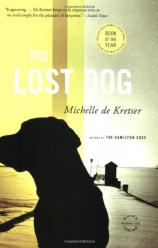Reading Group Guide
Discussion Questions
The Lost Dog

1. Suspense is a crucial element in this novel: Will Tom’s dog be found? What happened to Nelly’s husband? Are Tom and Nelly destined to be together? Which mystery in the plot did you most long to solve and why? Did Michelle de Kretser provide answers to all of your questions?
2. The Lost Dog is set in Melbourne, Australia, where Michelle de Kretser has lived for many years. She has said, “I loved picking out little random bits of the world around me — a house with a photograph on its façade, an overheard sentence, a derelict advertising sign.” What are some memorable sights and characteristics of your own town or neighborhood? How do they bring your environment to life and make it unique? How do these touchstones speak to the passage of time?
3. Tom Loxley immigrated to Australia from India when he was twelve, and Michelle de Kretser moved to Australia from Sri Lanka when she was fourteen. How do you think the author’s personal experience may have enriched her portrait of Tom? What differences might they both see between their homelands and modern Melbourne? How does materialism figure in?
4. Nelly Zhang is a high-spirited visual artist and Tom Loxley is a relatively somber, analytic scholar. How do these differences in temperament and vocation serve to bring them together? Do you think these dichotomies influence the outcome of their relationship? Is it true in your own experience that opposites attract?
5. “The past is not what is over but what we wish to have done with” (page 297). Do you agree? Would Tom agree? How can you reconcile this statement with Tom’s rescue of his mother’s old autograph album (page 195)?
6. Michelle de Kretser’s gifts as a prose stylist have won consistent praise from reviewers of The Lost Dog. In what ways, if any, did the author’s use of the language enhance your reading experience? Identify some metaphors used in the novel — e.g., “He was an umbrella tightly furled” — that seem to you particularly apt.
7. Instances of loss permeate this novel. Tom and his mother’s loss of their father and husband, and of their aromatic, warm, and spiritual birthplace; Nelly’s inclination to collect objects from the past; and, of course, the missing dog. How does de Kretser prevent her novel from being excessively elegiac? What do you see as the future for Tom and Nelly?
8. De Kretser writes that “the dog unleashed in Tom a kind of grace; a kind of beastliness” (page 189). In what ways do Nelly and Tom’s mother, Iris, serve as similar catalysts? Throughout The Lost Dog human physicality is acknowledged as frequently as our cerebral nature. How did you respond to this juxtaposition? Where have you read before, if ever, such intimate accounts of caretaking?
9. Discuss the failure of Tom’s first marriage. Was Karen being disingenuous when she claimed not to want children? Was Tom? In what sense does the dog’s disappearance stir regret in Tom about how his life has turned out?
10. It is a Jamesian idea that what is seen depends on who is seeing it. How does this idea color The Lost Dog? Do you believe, as Mogs did, that Carson Posner is Nelly’s son’s father? Do you think that Felix Atwood, Nelly’s vanished husband, was a pedophile? Do you believe Denise Corrigan’s theory that Nelly killed her husband? Is clear evidence for any of these suppositions given in The Lost Dog?
11. The Lost Dog takes place in 2001 and encompasses the attack of September 11. How does this event cause Tom to reflect on Australia’s colonial past and inhospitable present? In what ways can Americans identify with his thought that “Buried deep in Australian memories was the knowledge that strangers had once sailed to these shores and destroyed what they found” (page 234)?
12. Sitting with Nelly in her drafty kitchen, Tom thinks, “Existence was inseparable from tragedy and adventure, horror and romance; realism’s quiet hue derived from a blend of dramatic elements” (page 239). In what ways, if any, can you relate this sentiment to your own life, however seemingly uneventful or conventional it is?
The Lost Dog
- Publication Date: August 13, 2009
- Paperback: 352 pages
- Publisher: Back Bay Books
- ISBN-10: 0316001848
- ISBN-13: 9780316001847







